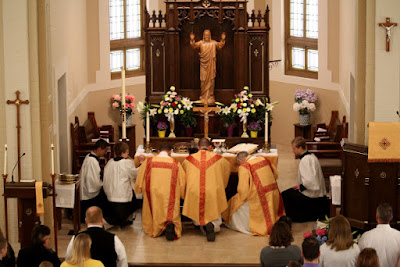A while ago there were some pictures and videos doing the rounds. One showed a female minister of the United Methodist Church participating fully in an LCMS installation of a pastor. The other showed a deaconess preaching and presiding at a confirmation. They are not the first nor the only examples of practices that push the limits and test the boundaries of our confession and of our fellowship as a church. I will not go into them here. They are old news but, unfortunately, not rare examples of those who chafe at both our confession and our confessional practice.
Strangely, some in our Synod equate those with a fuller liturgical practice in the same vein as those who would veer in the opposite direction of faith and practice -- evangelical style services or mainline Protestant identity. How odd it is that we find it so easy to put together those who are so very different and yet who, in their own ways, push at the boundaries of our faith and piety. One is distinctly minimalist -- using adiaphora in a way that was never intended to justify not different ceremonies but a different church and a different faith. Although they presume that style and substance are not the same, they also posit the strange idea that style can contradict and betray substance without the faith being harmed. Indeed, they seem some health in this. The other seeks no betrayal nor contradiction at all but merely to restore what had been lost to time, a lack of interest, or perhaps even some embarrassment over old practices that were once typical. I really do not get it.
It is time for us to stop playing the game that would suggest it is an equal violation of our fellowship to add what had been subtracted over time to the abandonment of our confession entirely. How can they be seen as even remotely the same? There is an answer to that question. The reality is that some among us are actually more comfortable exchanging Lutheranism with generic Protestantism than being Lutheran. There is a significant portion of our church that would rather see us sin on the side of evangelicalism rather than risk a hint of things Roman. Of course, most of the things that are seen to be Roman here are hardly ever practiced in the Rome of today but nearly all the things evangelical and Protestant are found somewhere in the great diverse universe of that is not Roman but Christian in America today. Funny how chanting is called Roman but the Romans who chant are few and far between. That is but one example. I could cite more.
Let me just say this. Confessional Lutheranism has more in common with the elaborate ceremonies we are obliged to call adiaphora than it does withe modern evangelicalism or the current incarnation of liberal Protestantism. We had a new bishop (oh, excuse me, District President) installed and some wags are complaining about three copes -- as if there must be a limit to how many copes there can or should be. But we are more than comfortable with polos and khakis or tees and raggedy jeans than a cope or three? Really? Or that complaint a while back from some District Presidents (whom I will not call bishops) who were shocked at genuflection at the consecration and creed. Really, we will not complain about those Lutherans who no longer follow any recognizable liturgy as legitimately Lutheran but dump on the guy who genuflects as a little to Roman for his own good?There is a definite difference between pushing the limits to restore part of our past that has fallen out of favor today than pushing the limits to flaunt what is not Lutheran and never will be Lutheran and was not ever envisioned by Lutherans in the greater Reformation era. Hymnals by their nature restore what has fallen out of common usage. They are never expressions of a maximum but of a minimum expected of those who share our confession. Yet we conveniently ignore the constitutional requirement of doctrinally pure hymnals, agendas, etc... and suddenly wake up when something from our ancient past is restored to usage. There is no real explanation for the way we equate both groups pushing the limits -- except that it seems some Lutherans are more comfortable with nothing rather than risk getting accustomed to something. Not that I have put it that way, it ought to be even more embarrassing.


No comments:
Post a Comment